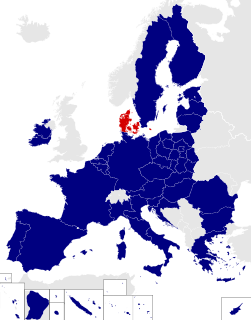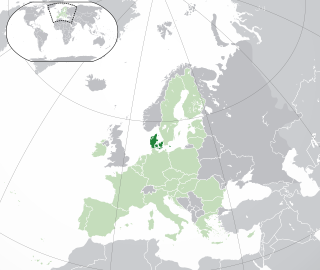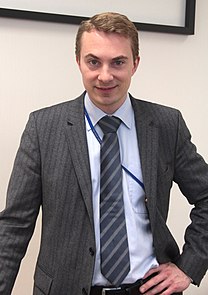
Euroscepticism means criticism of the European Union (EU) and European integration. It ranges from those who oppose some EU institutions and policies and seek reform, to those who oppose EU membership outright and see the EU as unreformable. The opposite of Euroscepticism is known as pro-Europeanism.

Poul Oluf Nyrup Rasmussen, was Prime Minister of Denmark from 25 January 1993 to 27 November 2001 and President of the Party of European Socialists (PES) from 2004 to 2011. He was the leader of the governing Social Democrats from 1992 to 2002. He was a member of the European Parliament from 2004 to 2009.
The June Movement was a Danish Eurosceptic political organisation founded 23 August 1992. It took its name from the referendum on the Maastricht Treaty that took place in Denmark in June of that year. The movement was a member of the European political party EUDemocrats - Alliance for a Europe of Democracies.

The Socialist People's Party is a green and popular socialist political party in Denmark.
Since the introduction of parliamentarism in Sweden, six national referendums have been held. Legal provisions for referendums were introduced in 1922, one year after the adoption of universal suffrage. The Constitution of Sweden provides for binding referendums, but all referendums held as of 2012 have been non-binding. The latest referendum, on adopting the euro, was held on 14 September 2003.
The Danish People's Party (DPP) is a political party in Denmark which is generally described as right-wing populist by academics and far-right by international media. It has also been described in academia and the media as a nativist and anti-immigrant party. The party was founded in 1995 by Pia Kjærsgaard, who was the leader of the party until 2012, when she passed the leadership on to Kristian Thulesen Dahl. The DPP lent its support to the Liberal-Conservative government from the general election of 2001 until the 2011 election defeat. While not part of the cabinet, DPP cooperated closely with the governing coalition on most issues and received support for key political stances in return, to the point that the government was commonly referred to as the "VKO-government".

Elections to the European Parliament were held between 10 and 13 June 2004 in the 25 member states of the European Union, using varying election days according to local custom. The European Parliamental parties could not be voted for, but elected national parties aggregated in European Parliamental parties after the elections.
The Democracy Movement (DM) is a crossparty Eurosceptic pressure group in the UK with over 320,000 registered supporters and 160 local branches.

Pro-Europeanism, sometimes called European Unionism, is a political position that favours European integration and membership of the European Union (EU). It includes the more radical European federalists, who seek to create a single superstate known informally as a United States of Europe. A related term is "Europhile".
The European Parliament election of 2004 in Denmark was the election of MEP representing Denmark constituency for the 2004-2009 term of the European Parliament. It was part of the wider 2004 European election. The vote took place on June 13. The opposition Social Democrats made major gains, mainly at the expense of Eurosceptic parties such as the June Movement.
The People's Movement against the EU is a political association in Denmark against the European Union. It was founded in 1972 as a cross-party campaign platform for a 'no' vote in Denmark's referendum on EEC membership. It currently has one member in the European Parliament.
Jens-Peter Rossen Bonde is a Danish politician and a former Member of the European Parliament (MEP) with the June Movement. He resigned as an MEP in May 2008. Bonde was elected to the European Parliament in the first election in 1979 with the People's Movement against the EU. He was re-elected 6 times consecutively. In 1992 he co-founded the June Movement which he chaired until his retirement May 2008.
National conservatism is a variant of conservatism that concentrates more on national interests and upholding cultural or ethnic identity than most other conservatives. In Europe, national conservatives are usually Eurosceptics. National conservatism shares characteristics with traditionalist conservatism and social conservatism given how the three variations focus on preservation and tradition. As national conservatism seeks to preserve national interests, traditional conservatism emphasizes ancestral institutions and social conservatism. National-conservative parties often have roots in environments with a rural, traditionalist or peripheral basis, contrasting with the more urban support base of liberal-conservative parties.

The Earth Party, previously called The Earth Party Movement, Movimento o Partido da Terra, abbreviated MPT, is a green conservative political party in Portugal, founded on 12 August 1993.

Denmark is one single European Parliament constituency. Since the June 2009 Parliament election it has been represented by thirteen members of the European Parliament. It covers the EU member state of Denmark, but not the Faroe Islands or Greenland which are not part of the EU.
The European Parliament election of 2009 in Denmark was the election of the delegation from Denmark to the European Parliament on 7 June 2009. The number of Danish MEPs elected was 13. The election was held simultaneously with a referendum on changing the Danish Act of Succession.

Denmark in the European Union refers to the historical and current issues of Denmark's membership in the European Union. Denmark has a permanent representation to the European Union led by ambassador Jeppe Tranholm-Mikkelsen, in Brussels. The current Foreign Minister and Minister for European Affairs is Anders Samuelsen.

The European Parliament election of 2014 in Denmark was an election held in Denmark on 25 May 2014 to decide who would represent Denmark in the European Parliament (EP) from 2014 to 2019. The Danish People's Party with 26.6% of the votes became the largest party for the first time in a nationwide Danish election.

A referendum on one of the country's opt-outs from the European Union was held in Denmark on 3 December 2015. Specifically, the referendum was on whether to convert Denmark's current full opt-out on home and justice matters into an opt-out with case-by-case opt-in similar to that currently held by Ireland and the United Kingdom. Approval of the referendum was needed for Denmark to remain in Europol under the new rules. However, it was rejected by 53% of voters.












